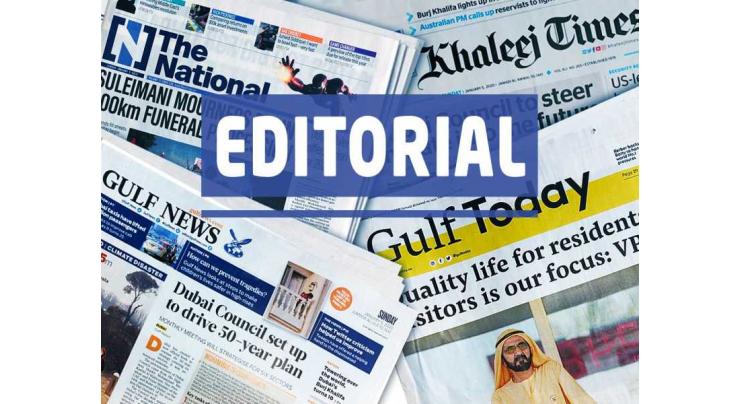
Local Press: UAE Maintains Marine Biodiversity
Fahad Shabbir (@FahadShabbir) Published June 10, 2021 | 10:00 AM

ABU DHABI, (UrduPoint / Pakistan Point News / WAM - 10th Jun, 2021) A UAE newspaper has said that climate change is stressing "our world’s environmental balance", highlighting the importance of studying biodiversity.
"Humans are privileged to be living in a planet that consists of water in 70% of its area," said Gulf Today in an editorial on Thursday quoting a United Arab Emirates University professor as saying that the climate crisis jeopardises the oceans and biodiversity, especially with the fact that oceans absorb nearly 30 percent of the carbon dioxide humans produce and reduce the effects of global warming.
As part of its celebration of World Oceans Day under the theme ‘The Ocean: Life and Livelihoods’, the Ministry of Climate Change and Environment (MoCCAE) announced the launch of a bio-digital survey of marine habitat in the UAE.
For the first time in the region, the 17-week pilot study will integrate aerial and underwater data, collected using drones and an underwater remotely operated vehicle (ROV) - a mobile robot designed for an aquatic work environment, the paper said.
The pilot phase will take place in the coastal area of Umm Al Quwain, given its widely diverse terrain and marine habitats, such as coral reefs, seagrass meadows, and natural creeks.
Talking of coral reefs, the climate-change-induced rise in seawater temperature is a key driver of marine ecosystem degradation. Coral bleaching is a prime example, as it causes coral reefs to lose their role as vital habitat for marine life.
The launch by H.H. Sheikh Hamdan bin Zayed Al Nahyan, Ruler's Representative in Al Dhafra Region and Chairman of the board of Directors of the Environment Agency - Abu Dhabi (EAD), of the largest coral reef rehabilitation project in the region is truly praiseworthy. The project includes more than a million colonies of the coral reef through a replanting programme, to increase the emirate’s total coral reef area.
The paper went on to say, "Coral reefs are considered one of the most important and productive marine habitats.
The reefs support biological diversity in the Emirate of Abu Dhabi and provide a natural habitat for many types of fish and marine life, in addition to their role in protecting beaches from erosion, and supporting fisheries and many recreational and tourism activities in Abu Dhabi.
"The Emirate of Abu Dhabi contains 34 different types of hard corals spread in several locations, including Ras Ghanada, Butinah, Saadiyat and Alnouf. Through this programme, nurseries for coral will be developed to reduce the negative impact of the natural pressures to which coral reefs are subjected due to climate change and high temperatures on the seafloor."
The UAE Government has long realised that the country is blessed with rich marine biodiversity and assigned great importance to preserve it and ensuring its sustainability.
"Oceans are also key to the global economy, with an estimated 40 million people working in ocean-based industries by 2030," added the editorial comment.
The preservation of coastal areas and oceans – of which dugongs and seagrasses are key and fragile components – is of paramount importance. Environment Agency – Abu Dhabi (EAD) has announced that an online toolkit to support dugong and seagrass conservation has been selected as one of the 25 most noteworthy innovations in the UAE’s Government sector by Mohammed Bin Rashid Centre for Government Innovation.
The Sharjah-based daily concluded by quoting Sheikh Nahyan bin Mubarak Al Nahyan, Minister of Tolerance and Coexistence, as saying, "Sheikh Zayed told us: ‘We cherish our environment because it is an integral part of our country, our history and our heritage, If we fail to protect it, our children, rightly, will reproach us for squandering an essential part of their inheritance.’ "As our world faces the challenges of climate change, it is increasingly important that we encourage the study of our biodiversity, here in the UAE and on a global scale."
Related Topics
Recent Stories

Saudi FM urges immediate ceasefire in Gaza

Expanded, rebranded National Women's One-Day tournament to start tomorrow

President, Saudi FM discuss challenges being faced by Muslim Ummah

Bushra Ansari ties knot with Iqbal Hussain

Shaheen likely to miss initial two matches of Pak Vs NZ T20I series

LHC suspends PML-N Rana Arshad’s victory notification from PP-133

Faizabad Dharna Commission exonerates former Spy Chief Faiz Hameed

Pakistan calls for enhanced information integrity on digital platforms

Pakistan starts discussion with IMF about new loan agreement: Finance Minister

Currency Rate In Pakistan - Dollar, Euro, Pound, Riyal Rates On 16 April 2024

Today Gold Rate in Pakistan 16 April 2024

Govt hikes petrol price by Rs4.53 per litre for next fortnight
More Stories From Middle East
-

UAE announces ‘Zero Bureaucracy Program’ to reduce bureaucracy
2 months ago -

COP28 President-Designate welcomes Transitional Committee agreement to operationalise Loss and Damag ..
5 months ago -

Global Media Congress 2023 to feature Co-Production Majlis as a new networking platform
5 months ago -

Young female athletes shine at Abu Dhabi World Youth Jiu-Jitsu Championship
5 months ago -

King of Jordan receives Abdullah bin Zayed and ministers participating in Arab coordination meeting
5 months ago -

Abdullah bin Zayed participates in coordination meeting of Arab foreign ministers, joint meeting wit ..
5 months ago
-

3rd annual conference of Emirates Society of Clinical Microbiology kicks off in Dubai
5 months ago -

SIBF 2023 hosts Nobel laureate to discuss emergence of ‘Afrofuturism’ in global discourse
5 months ago -

ALC announces winners of Kanz Al Jeel Award 2023
5 months ago -

SIBF turns spotlight on remarkable contributions of women
5 months ago -

Global assets in spot bitcoin ETFs hit $4.16 billion
5 months ago -

Rescuers struggle to find Nepal quake survivors as deaths reach 157
5 months ago











